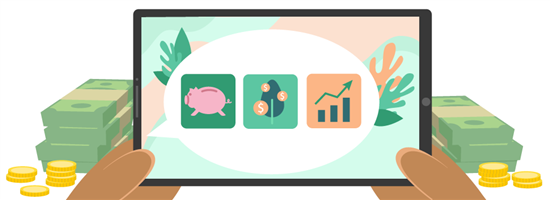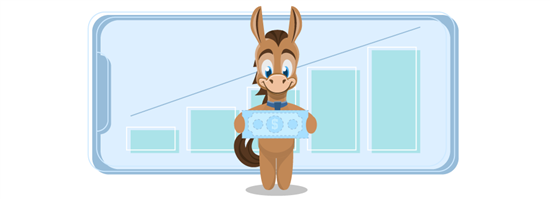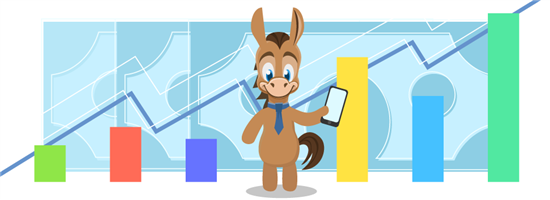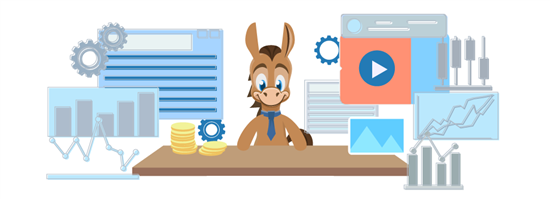Stash vs Acorns vs Robinhood
Stash, Acorns, Robinhood - which reigns supreme? Uncover their unique features and earning potentials to guide your investment choices.
 |
| © CreditDonkey |
Investing is the best way to grow your money and retire stress-free. But who has a thousand bucks lying around to start?
That's why many beginners use Stash, Acorns or Robinhood.
These micro-investing apps allow anyone to start, even if you just have a few dollars. Each one works a little differently.
Acorns automatically invests your spare change, while Stash guides you through the process of building a portfolio. Robinhood lets you trade completely commission-free.
Are they worth the hype? Read on to see how they compare and which one is best for you.
Who Is Each App Best For?
Each app is targeted toward a different type of investor.
- Acorns is best for hands-off investors. Acorns automatically chooses your investments and manages your portfolio for you. It's best for "set it and forget it" long-term investing.
- Stash is best for beginners who want to learn. Stash guides you through the steps in investing and helps you choose investments suited for your goals. You manage your own portfolio but still have some hand holding.
- Robinhood is best for experienced active traders. Robinhood is completely DIY investing. First-time traders will receive a one-time personalized recommended portfolio, but it's only available for new investors who haven't placed a trade on Robinhood yet.
Now let's go into more detail about each one.
About Acorns
Acorns
Pros:
| Cons:
|
Our Review: ![]()
![]()
![]()
![]()
![]()
Founded in 2012, Acorns is one of the original "spare change" robo-advisors. After linking your credit and debit cards, your purchases will be rounded up to the nearest dollar and the change invested. You can also set custom rules and recurring deposits.
Acorns chooses your investments for you based on how aggressively you want to invest. It takes care of all portfolio management, including rebalancing.
Acorns now also offers retirement accounts and a checking account with a debit card (for extra monthly fees).
Acorns is a good idea for people looking for a passive way to save and invest money. It doesn't require much effort and you'll still take advantage of the stock market if it does well.
About Stash
Stash
Pros:
| Cons:
|
Our Review: ![]()
![]()
![]()
![]()
![]()
Stash was founded in 2015 and takes a different approach. After you answer some questions about your goals, risk tolerance, and interests, the app will give you investment recommendations. It will help you build a personalized, diversified portfolio.
Stash is not a robo-advisor. It merely provides guidance and does not manage your portfolio for you.
Stash also offers IRAs, custodial accounts, and a banking account with a debit card.
Absolutely! But you can also lose money with Stash, just like any other investment. Your portfolio success depends on the market and how each of the investments you select is performing.
About Robinhood
Robinhood
Pros:
| Cons:
|
Our Review: ![]()
![]()
![]()
![]()
![]()
When Robinhood was founded in 2013, it made huge waves by offering completely 100% commission-free trades. This allowed anyone to invest without losing money to trading fees.
Currently, the app supports trading in stocks, ETFs, options, cryptocurrencies, and fractional shares.
Robinhood is a self-directed trading app. You make your own investment decisions and manage your own portfolio.
You could also earn weekly bonuses on round-ups, get paid early with direct deposit, and invest round-ups and part of every paycheck in your choice of stocks and crypto.[1]
 |  | ||
Acorns | Stash | Robinhood | |
|---|---|---|---|
$20 Investment Bonus - | Sign Up and Get $5 - | Get a Free Stock (worth between $5 and $200) - | |
Benefits and Features | |||
| Annual Fee |
|
| |
| Minimum Deposit | |||
| Fractional Shares | |||
| Taxable Accounts | |||
| IRA Accounts | |||
| Phone Support | Yes - normal business hours, plus Sat & Sun 11a-5p ET | ||
| Banking | Included in Acorns Bronze ($3/mo). Free metal debit card, no minimum balance, no overdraft fees, and 55,000+ fee-free ATMs nationwide. | All users get a cash account with a debit card. No minimum balance, no overdraft fees, and free ATM access at 55,000+ ATMS. | Offers Robinhood spending account with Robinhood Cash Card issued by Sutton Bank |
What They Have in Common
- All three are micro-investing apps.
- All platforms support fractional shares. Robinhood and Stash let you buy stocks of companies starting from just $1. Acorns purchases fractional shares for you automatically.
- All are designed for beginners with a user-friendly interface.
- All three support individual taxable accounts and retirement accounts.
- The main investment offerings are stocks and ETFs.
- All three also offer an optional banking account.
- All three have a round-up feature to help you save automatically.
How They Are Different
The main difference is that Robinhood provides a one-time personalized recommendation of ETF investment portfolio for first-time traders, while Stash helps you build a portfolio. And Acorns makes all the choices for you.
Here are some other key differences.
- Acorns and Stash both charge a monthly fee for the basic accounts. Robinhood is free.
- Stash and Robinhood allow you to choose your own stocks and ETFs. Acorns lets you choose individual stocks for your portfolio if you subscribe to their highest plan.
Do you prefer being able to choose which assets to invest in?
- Robinhood also allows you to trade in options and cryptocurrencies. The other two don't.
Stash starts from $3 per month for their service. Robinhood is completely free. But Robinhood requires more investment knowledge because you're responsible for building your own portfolio. Stash guides you to choose investments to make it a little easier for beginners.
Fees
 |
| © CreditDonkey |
Winner: Robinhood
Robinhood is a completely free service and there are no trading fees. But a small monthly fee for the other 2 platforms may be worth it to you for the guidance.
Here's how the fees compare:
- Stash starts at $3 per month
Stash Growth costs $3/month and includes retirement accounts. Stash+ costs $9/month and includes 2 custodial accounts for your kids.[2] - Acorns starts at $3 per month
The basic Acorns Bronze plan is $3/month for all balances. This also includes IRA account and the Acorns Checking account with a debit card. For $12 per month, you can add unlimited investment accounts for your kids.[3] - Robinhood is completely free
Robinhood charges no monthly account fees and no trading fees.[4]
However, for high balances, $3 a month is pretty cheap. Robo-advisors like Betterment charges 0.25% of assets under management for accounts $20,000 or more. So if you have $25,000, that's $62.50 per year.
For more low-cost investing options, check out our guide on the best free stock trading apps.
Earning Potential and Risk
 |
| © CreditDonkey |
Winner: Depends
- Since Robinhood is completely DIY, you can choose your own investments. With smart investments, you can get higher returns. Plus, it allows you to invest in cryptos, which gives you more opportunities for growth.
But if you don't know what you're doing, it can also be the most risky if you don't choose wisely or have poor timing.
- Stash curates investment choices for you based on your risk tolerance. This gives you control over your choices but also limits your risk.
- Acorns does all the investment for you, so the performance of your portfolio is out of your hands. You can choose your level of risk from conservative to aggressive. Your investments are automatically diversified across 7,000+ stocks and bonds.
Acorns manages your risk. It's designed to match market performance and provide steady returns.
It's important to note that all investments involve a level of risk. No matter which investments you choose, your portfolio may drop in value depending on market conditions.
The best way to manage risk is to diversify your portfolio. Investing in lots of different stocks with different levels of risk lessens the blow when a particular investment underperforms.
Customization
 |
| © CreditDonkey |
Winner: Robinhood
- Robinhood offers the most customization
Robinhood allows you to select your own individual stocks, funds, and options. You can even invest in gold and cryptocurrency. This lets users completely hand pick their investment mix.Does Robinhood affect your credit score?
No, Robinhood doesn't report anything to credit bureaus and they won't check your credit score if you sign up. - Stash has a mix of custom and ready-made portfolios
Stash lets you choose your own individual stocks or you can invest in their curated themed portfolios. You can select portfolios based on industry or causes you support.For example, you can invest in their "Clean and Green" mix. That fund is comprised of clean energy sources like wind and solar.
- Acorns chooses everything for you
You can only select one of five pre-built portfolios based on your risk tolerance, ranging from conservative to aggressive. You can also choose individual stocks for your portfolio, but this option is only available with the Gold subscription.
Customer Service
Winner: Acorns and Stash
All three offer customer support via email and phone to their users. Stash also has a form on its website where you can ask questions before signing up.
Robinhood only offers live phone support once you're an existing user. You must first request a call through the Robinhood app, and an agent will get back to you.[5] There's no way to contact Robinhood if you're not a customer.
- Acorns: (855) 739-2859, support@acorns.com
- Stash: (800) 205-5164, support@stashinvest.com
Security
Winner: all three get full marks
Acorns, Stash, and Robinhood all use industry standard 256-bit encryption to protect your personal and financial data. You can trust that your data is safe with them.
All three are members of the SIPC (Securities Investor Protection Corporation). The SIPC protects your securities up to $500,000 per account type if the platform goes out of business.[6]
But the SIPC will NOT protect you from losing money through investing. Any cryptocurrency investments through Robinhood are also not protected by SIPC.
Best for Young or New Investors: Acorns
Acorns is the best choice for young or inexperienced investors, since the robo-advisor will manage everything for you. Round-up rules make it easy to "invest without thinking," so it's also good for young investors who have trouble saving.
There is no minimum to get started, and as soon as your round-ups reach $5, Acorns will automatically invest for you.
Some unique features include:
- Custom rules: You can adjust your round-up rules, such as applying multipliers and only rounding up specific purchases.
- Acorns Earn: Earn extra money when you shop with Acorns' 15,000+ brand partners. Link a credit or debit card to your Acorns account. Then, as you shop with brand partners, you'll earn a bonus that will be automatically invested.
- Acorns checking: For $3 a month, you can also get the Acorns checking account with a debit card. There is no minimum balance, no overdraft fees, and unlimited free or fee-reimbursed ATMs nationwide.
Read more in the full Acorns review.
With the combination of retirement, investment, and checking accounts, Acorns can house almost your entire financial picture. So it's also a good option for young adults who want to manage all their finances within one app.
Should You Consider Acorns?
Acorns is great for new investors or those looking for a passive way to save money. It's easy to use and you don't have to put any effort into it once you set up your portfolio.
$20 Investment Bonus
- Open an Acorns account (new users only)
- Set up the Recurring Investments feature
- Have your first investment be made successfully via the Recurring Investments feature
Acorns has no minimum requirement. You can start investing with Acorns as soon as your balance reaches $5. They believe "from acorns mighty oaks do grow," which is why they've built their platform to be accessible at small dollar amounts.
Best for Learners: Stash
Stash is a good option if you're looking to learn more about investments. Stash provides suggestions for your investment portfolio. But the choice is up to you in the end. Stash also offers plenty of educational resources for new investors.
Unique features include:
- Stock-back rewards: When you use your Stash debit card at any of the 11 million participating places, you get a small share of stock from that business added to your investment portfolio.
- Socially responsible investing: Stash categorizes stocks into themes, so it's easy for you to choose what you're interested in. This includes socially responsible investing.
For example, Stash has a category for Missions and Causes, where you can support what you believe in. One of the ETFs you can choose is Combat Carbon, which only includes companies that are actively reducing their carbon footprint.
- Auto-stash: These features allow you to automate your investments. You can set up round-up rules or a set schedule to transfer funds.
- Cash management account: All users get a cash account with a debit card. There is no minimum balance and no overdraft fees. You get free ATM access at 19,000+ ATMs.
Read more in the full Stash Invest review.
Should You Consider Stash?
Stash is a nice option for people wanting to learn the investment world without taking on too much risk. With just $3 per month, you can choose from plenty of investment options and get unlimited trading.
It's also a neat way to support causes that you care about.
Sign Up and Get $5
- Sign up, add at least $5 to your account and get a $5 bonus.
- Invest with fractional shares
- Get portfolio recommendations
Stash and Acorns offer different ways to invest. If you're looking for a passive investment option, Acorns is probably better for you. But if you'd like some say on what investments your money buys, Stash is what you want.
The fees for each are comparable, but always make sure you're getting what you need out of the app and not paying for extras you won't use.
What the Experts Say
As part of our series on saving and investing, CreditDonkey asked a panel of industry experts to answer readers' most pressing questions. Here's what they said.
Best for Active Traders: Robinhood
Robinhood is a great investment app for active traders. It is 100% free to use, aside from the required regulatory costs. Plus, there are no minimum account balance requirements. You'll just need money in your account to purchase investments.
Unique features include:
- Extended trading hours: You can trade 2.5 hours earlier before the market opens and 4 more hours after it closes. Traditionally, markets are open from 9:30 am to 4:00 pm, extended-hours means trading from 7:00 to 9:30 a.m. or 4:00 to 8:00 p.m. ET[7]
- Day trading: Perform up to 3 day trades in a five-trading day period. Those with $25,000+ account balance have no limitations.[8]
- Research and tools: This a limited, but you can get real-time market updates, candlestick charts, and indicators for stocks and cryptocurrencies.
Read more in the full Robinhood review.
Should You Consider Robinhood?
The best feature of Robinhood is the price: free. You won't pay to use the app and there are no trading fees. It's a great option for active traders looking for a way to save on trade fees.
Robinhood also offers customization and added variety with choices like options, gold, and crypto investing. It's best for more experienced investors.
Robinhood isn't the best investment platform for beginners. They offer first trade recommendations but you won't receive any investment advice if you have already invested in your recommended portfolio. Unless you know what you're doing, it's best to stick with other investment apps, like Acorns.
Bottom Line
If you're looking for a way to invest right from your mobile device, Robinhood, Acorns, and Stash all have something to offer. While they all offer investment accounts, the features and service you get with each of them varies.
Take your time to weigh the options based on what will fit your lifestyle the best.
References
- ^ Robinhood. Robinhood Cash Card Agreement, Retrieved 9/30/22
- ^ Stash. Pricing, Retrieved 9/30/22
- ^ Acorns. Pricing, Retrieved 9/30/22
- ^ Robinhood. Fees, Retrieved 9/30/22
- ^ Robinhood. How to contact phone support, Retrieved 9/30/22
- ^ SIPC. What SIPC Protects, Retrieved 9/30/2022
- ^ Robinhood. Extended-Hours Trading, Retrieved 9/30/22
- ^ Robinhood. Pattern day trading, Retrieved 9/30/22
Donna Tang is a content associate at CreditDonkey, a personal finance comparison and reviews website. Write to Donna Tang at donna.tang@creditdonkey.com. Follow us on Twitter and Facebook for our latest posts.
Note: This website is made possible through financial relationships with some of the products and services mentioned on this site. We may receive compensation if you shop through links in our content. You do not have to use our links, but you help support CreditDonkey if you do.
|
|
|


